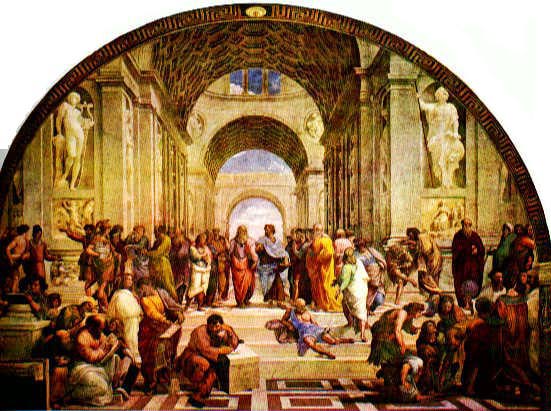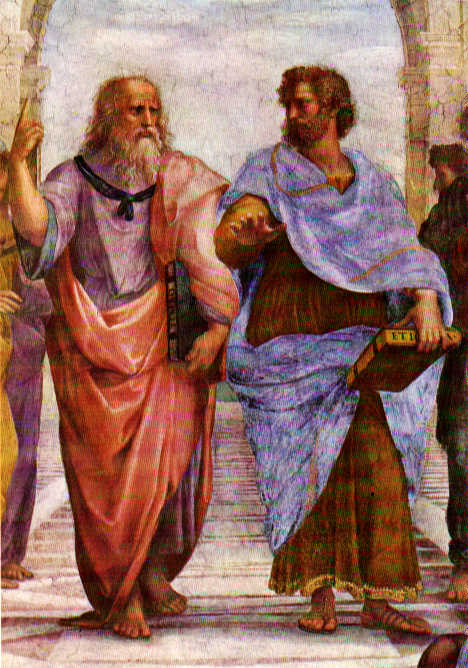
All the major philosophers of Hellenistic Culture are pictured in this painting the `School of Athens' by Raphael.

All the major philosophers of Hellenistic Culture are pictured in this painting the `School of Athens' by Raphael.

In the center of the painting are Aristotle and Plato, Aristotle's hand level to the Earth symbolizing his realism view of Nature; Plato's hand pointed towards the heaven symbolizing the mystical nature to his view of the Universe.
Aristotle:
Aristotle stands in the Greek philosophical tradition which asserts that nature is understandable. This tradition, opposed to the idea that nature is under the control of capricious deities which are to be appeased rather than understood, is one of the roots of science.
Aristotle constructed his view of the Universe based on a intuitive felling of holistic harmony. Central to this philosophy was the concept of teleology or final causation. He supposed that individual objects (e.g. a falling rock) and systems (e.g. the motion of the planets) subordinate their behavior to an overall plan or destiny. This was especially apparent in living systems where the component parts function in a cooperative way to achieve a final purpose or end product.
Plato founded a school of philosophy in Athens known as the Academy. Here Aristotle (384-322 BC), Plato's younger contemporary and only rival in terms of influence on the course of Western philosophy, came to study. Aristotle was often fiercely critical of Plato, and his writing is very different in style and content, but the time they spent together is reflected in a considerable amount of common ground. Thus, Aristotle holds with Plato that the life of virtue is rewarding for the virtuous, as well as beneficial for the community. Aristotle also agrees that the highest and most satisfying form of human existence is that in which man exercises his rational faculties to the fullest extent. One major difference is that Aristotle does not accept Plato's theory of forms, or universal ideas, existing independently of particular things. Thus he does not argue that the path to goodness is through knowledge of the universal form or idea of "the good."
Aristotle's ethics are based on his view of the Universe. He saw it as a hierarchy in which everything has a function. The highest form of existence is the life of the rational being, and the function of lower beings is to serve this form of life. This led him to defend slavery--because he thought barbarians were less rational than Greeks and by nature suited to be "living tools"--and the killing of nonhuman animals for food or clothing. From this also came a view of human nature and an ethical theory derived from it. All living things, Aristotle held, have inherent potentialities and it is their nature to develop that potential to the full. This is the form of life properly suited to them and constitutes their goal. What, however, is the potentiality of human beings? For Aristotle this question turns out to be equivalent to asking what it is that is distinctive about human beings, and this, of course, is the capacity to reason. The ultimate goal of humans, therefore, is to develop their reasoning powers. When they do this, they are living well, in accordance with their true nature, and they will find this the most rewarding existence possible.
Aristotle thus ends up agreeing with Plato that the life of the intellect is the highest form of life; though having a greater sense of realism than Plato, he tempered this view with the suggestion that the best feasible life for humans must also have the goods of material prosperity and close friendships. Aristotle's argument for regarding the life of the intellect so highly, however, is different from that used by Plato; and the difference is significant because Aristotle committed a fallacy that has often been repeated. The fallacy is to assume that whatever capacity distinguishes humans from other beings is, for that very reason, the highest and best of their capacities. Perhaps the ability to reason is the best of our capacities, but we cannot be compelled to draw this conclusion from the fact that it is what is most distinctive of the human species.
A broader and still more pervasive fallacy underlies Aristotle's ethics. It is the idea that an investigation of human nature can reveal what we ought to do. For Aristotle, an examination of a knife would reveal that its distinctive quality is to cut, and from this we could conclude that a good knife would be a knife that cuts well. In the same way, an examination of human nature should reveal the distinctive quality of human beings, and from this we should be able to conclude what it is to be a good human being. This line of thought makes sense if we think, as Aristotle did, that the Universe as a whole has a purpose and that we exist as part of such a goal-directed scheme of things, but its error becomes glaring once we reject this view and come to see our existence as the result of a blind process of evolution. Then we know that the standards of quality for knives are a result of the fact that knives are made with a specific purpose in mind and that a good knife is one that fills this purpose well. However, strictly from reason we can not conclude that human beings are made with any particular purpose in mind. Their nature may be the result of random forces of natural selection and thus cannot, without further moral premises, determine how they ought to live.
It is to Aristotle that we owe the notion of the final end, or, as it was later called by medieval scholars, the summum bonum--the overall good for human beings. This can be found, Aristotle wrote, by asking why we do the things that we do. If we ask why we chop wood, the answer may be to build a fire; and if we ask why we build a fire, it may be to keep warm; but, if we ask why we keep warm, the answer is likely to be simply that it is pleasant to be warm and unpleasant to be cold. We can ask the same kind of questions about other activities; the answer always points, Aristotle thought, to what he called eudaimonia. This Greek word is usually translated as "happiness," but this is only accurate if we understand that term in its broadest sense to mean living a fulfilling, satisfying life. Happiness in the narrower sense of joy or pleasure would certainly be a concomitant of such a life, but it is not happiness in this narrower sense that is the goal.
In searching for the overall good, Aristotle separates what may be called instrumental goods from intrinsic goods. The former are good only because they lead to something else that is good; the latter are good in themselves. The distinction is neglected in the early lists of ethical precepts that were surveyed above, but it is of the first importance if a firmly grounded answer to questions about how one ought to live is to be obtained.
Aristotle stands in the Greek philosophical tradition which asserts that nature is understandable. This tradition, opposed to the idea that nature is under the control of capricious deities which are to be appeased rather than understood, is one of the roots of science. Aristotle, his philosophical forerunners, and his followers, attempted to make sense of the world without personalizing it, an important step in establishing objectivity as a goal of science.
Aristotle also provides a good example of the way in which what one knows or believes influences the way one understands new information. His theory of motion flows from his understanding of matter as constituted of four elements: air, earth, fire, and water. Objects, being solid like earth, would tend to clump together with other solids (earth), so objects tend to fall to earth, their natural place. An object's natural state is then at rest. Certainly, this explains a common observation. Falling is an example of a natural motion in Aristotle's scheme.
The difficulty comes in thinking about horizontal motion. Aristotle considered this an example of unnatural motion, and it required further explanation. In Aristotle's physics, objects at rest are expected and don't need an explanation. Making an object move usually has a pretty obvious cause, so that's not troublesome either. What's difficult is explaining why something continues in motion. Think of a spear being thrown. At first, it is not in motion, but then the thrower's arm provides an impetus which accelerates it (our vocabulary, not Aristotle's). No big problem yet. But then, what keeps it going after it leaves the thrower's hand? It should fall to earth immediately since there's nothing obvious pushing it! Aristotle's answer was that as the spear flies through the air, it leaves a vacuum behind it. Air rushing in (the source of the cliche "nature abhors a vacuum") pushes the spear forward until its natural motion (falling) eventually brings it to earth.
Aristotle also thought about the causes which start things moving. In the spear scenario, it's easy to say that the thrower's arm moves the spear, but what moves the thrower's arm? Aristotle said that another motion moved the arm (muscle contraction?) but he also realized that some earlier motion must cause the muscle to contract and that earlier motion must also have its own initiator. To avoid the idea that their is an infinite chain of causes, Aristotle argued that there must be an "unmoved mover," something which can initiate motion without itself being set in motion.
Aristotle was revered as the greatest thinker of his time. Since neither Aristotle nor anyone else thought it good to test theories by experiment, his ideas persisted for nearly 2000 years. The early Christian Church incorporated this idea into its conception of a Creator and thus made Aristotelian physics part of its world view. Challenges to Aristotle were strongly discouraged by the Church throughout the middle ages, further establishing his ideas as "right." When Galileo's experiments led him to disagree with the Aristotelian view, he was tried as a heretic. Experimental results were not persuasive against Aristotle's authority.
Excerpt from the Encyclopedia Britannica without permission.